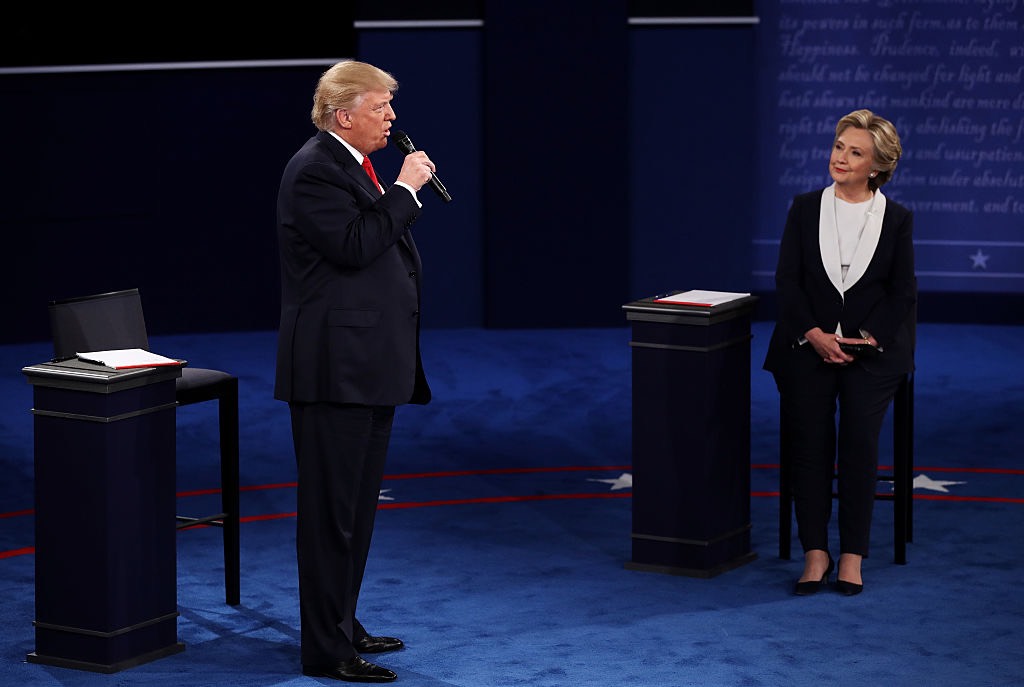Locker-Room Talk & Alternate Realities: Scientists Dissect Presidential Debate

Get the world’s most fascinating discoveries delivered straight to your inbox.
You are now subscribed
Your newsletter sign-up was successful
Want to add more newsletters?

Delivered Daily
Daily Newsletter
Sign up for the latest discoveries, groundbreaking research and fascinating breakthroughs that impact you and the wider world direct to your inbox.

Once a week
Life's Little Mysteries
Feed your curiosity with an exclusive mystery every week, solved with science and delivered direct to your inbox before it's seen anywhere else.

Once a week
How It Works
Sign up to our free science & technology newsletter for your weekly fix of fascinating articles, quick quizzes, amazing images, and more

Delivered daily
Space.com Newsletter
Breaking space news, the latest updates on rocket launches, skywatching events and more!

Once a month
Watch This Space
Sign up to our monthly entertainment newsletter to keep up with all our coverage of the latest sci-fi and space movies, tv shows, games and books.

Once a week
Night Sky This Week
Discover this week's must-see night sky events, moon phases, and stunning astrophotos. Sign up for our skywatching newsletter and explore the universe with us!
Join the club
Get full access to premium articles, exclusive features and a growing list of member rewards.
Donald Trump and Hillary Clinton took the debate stage Sunday evening. We asked three scholars from the Washington University in St. Louis, where the debate was held, to pick a key quote from the evening and tell us why it was important.
Rebecca Wanzo
"This was locker room talk." - Trump
Donald Trump defended the content of a video leaked from Access Hollywood by saying that his discussion of grabbing and kissing women without their consent is part of an everyday culture of masculinity. Trump reinforced that in the debate, saying that the candidates needed to talk about "more important" issues.
Is it typical for men to brag and joke about sexually assaulting women?
Some studies suggest that a troubling number of men would rape women if they would not be punished. Masculinity scholar Michael Kimmel has written eloquently about how many boys are socialized into "guyland," which is a "privileged sense that you are special, that the world is there for you to take." This is the kind of research that supports the claim that a "rape culture" exists.
If we take this scholarship seriously, then Trump may be correct in his statement that we live in a culture where men frequently joke about having, and attempting, sexual contact with women without their consent. Trump has never been convicted of sexual assault, but he has been accused of sexual harassment and violence more than once. However, he stated in the debate that he has never attempted to have sexual contact with a woman absent her consent, drawing a line between action and speech.
Even if we choose to believe that the accusations against him, or his own claims about what he has done, are false, we are still left with the question of whether or not the "locker room" defense is a good one. His defense depends on a consistent rhetorical feature of his campaign – attacking "politically correct" speech and embracing racist and sexist speech as evidence of his truth-telling.
In Trump's campaign, his sexist language has often been excused as part of what men do. Perhaps this tape hit a nerve because it supports what is still a contentious claim to many U.S. citizens bothered by "political correctness" – that how you see and talk about people inevitably has a relationship to what you do to them.
Get the world’s most fascinating discoveries delivered straight to your inbox.
Rebecca Wanzo is author of "The Suffering Will Not Be Televised."
Peter Kastor
"I'm sorry I have to keep saying this, but he lives in an alternative reality." –Clinton
Clinton said these words in an effort to criticize Trump. But for all the words that Donald Trump and Hillary Clinton said tonight, more striking are two words they hardly said at all: Democrat and Republican. That near silence constitutes a striking break from previous debates, and a telling reminder of what makes this campaign so unusual.
The debate was highly personal, with both candidates heaping accusations on each other as individuals. But tonight, Trump and Clinton made clear that each of their candidacies is the logical result of democratizing the nominating process and weakening the importance of the political parties.
As a historian of the early American republic, I study and teach about the presidency over its long history. For much of U.S. history, party leaders selected their nominees. This system came into being in the 1820s and 1830s before dying a slow death in mid-20th century and only truly coming to an end in the 1970s.
The system was supposed to be democratic. It replaced the caucus system through which members of Congress, meeting in isolation in Washington, selected nominees in the first quarter of the 19th century. But in the 20th century, the longstanding traditions of party nomination disintegrated in the face of criticisms that it blocked out party members. Critics charged that nominees were chosen in "smoke-filled rooms," the products of corrupt and secretive deal-making.
Trump secured the nomination by bypassing the leadership of his party. In sharp contrast, Hillary Clinton pursued the presidency by building her strength within the Democratic Party.
But, when it came time for the two candidates to debate each other, they turned to a highly personal politics. Parties didn't matter, only individuals. In an era when Americans are increasingly critical of the two major parties, this debate, for its strange moments, makes perfect sense.
Peter Kastor is author of "William Clark's World: Describing America in an Age of Unknowns."
Jeffrey Q. McCune
"Hillary is constantly talking about the inner cities of our country, which are a disaster. Education-wise. Job-wise. Safety-wise. In every way possible, I'm going to help the African-Americans, help the Latinos, Hispanics. I am going to help the inner cities." –Trump
Donald Trump has repeated this message across the country, in debates and political rallies. I believe this rhetoric denies the beauty and dynamic culture of "the African-American" and "the Latinos" across the nation.
Most importantly, it positions racial minorities at the center of the landscape of the inner city, intentionally excluding the role of white people and large corporations in shifting the environmental and cultural dynamics of communities of color.
Why does Donald Trump describe the inner city only as disastrous? Whom does he blame for creating this "disaster?" And, most importantly, what does fixing the inner city look like for Trump?
Sociologists from Mary Patillo to Laurence Ralph have long shown that the realities of crime and poverty in inner cities are a result of systemic and political decay. What is striking about Trump's rhetoric is that he pitches the idea of inner-city decay as something he alone can fix, without any clear indicator of an intimate relationship with said communities. The inner city he continues to imagine in his rhetoric contains the Latina/os, African-Americans and women who, I believe, may take issue with his proposal to build a wall between the U.S. and Mexico, his bragging of sexual assault and his claims of minorities as always suffering.
Trump's inability to discuss minority communities beyond despair and decay is evidence of how he imagines black and brown life in America. This treatment of difference, combined with his rhetoric and treatment of women, makes his vow to be a "president for all people" a hard sale.
Jeffrey Q. McCune, Jr. is author of "Sexual Discretion: Black Masculinity and the Politics of Passing." He is also collecting oral histories of Ferguson for "The Divided City," an urban humanities initiative.
Jeffrey Q. McCune Jr., Associate Professor of Women, Gender and Sexuality Studies, Washington University in St Louis; Peter Kastor, Professor of History & American Culture Studies, Washington University in St Louis, and Rebecca Wanzo, Associate Professor of Women, Gender, and Sexuality Studies, Washington University in St Louis
This article was originally published on The Conversation. Read the original article.
 Live Science Plus
Live Science Plus










